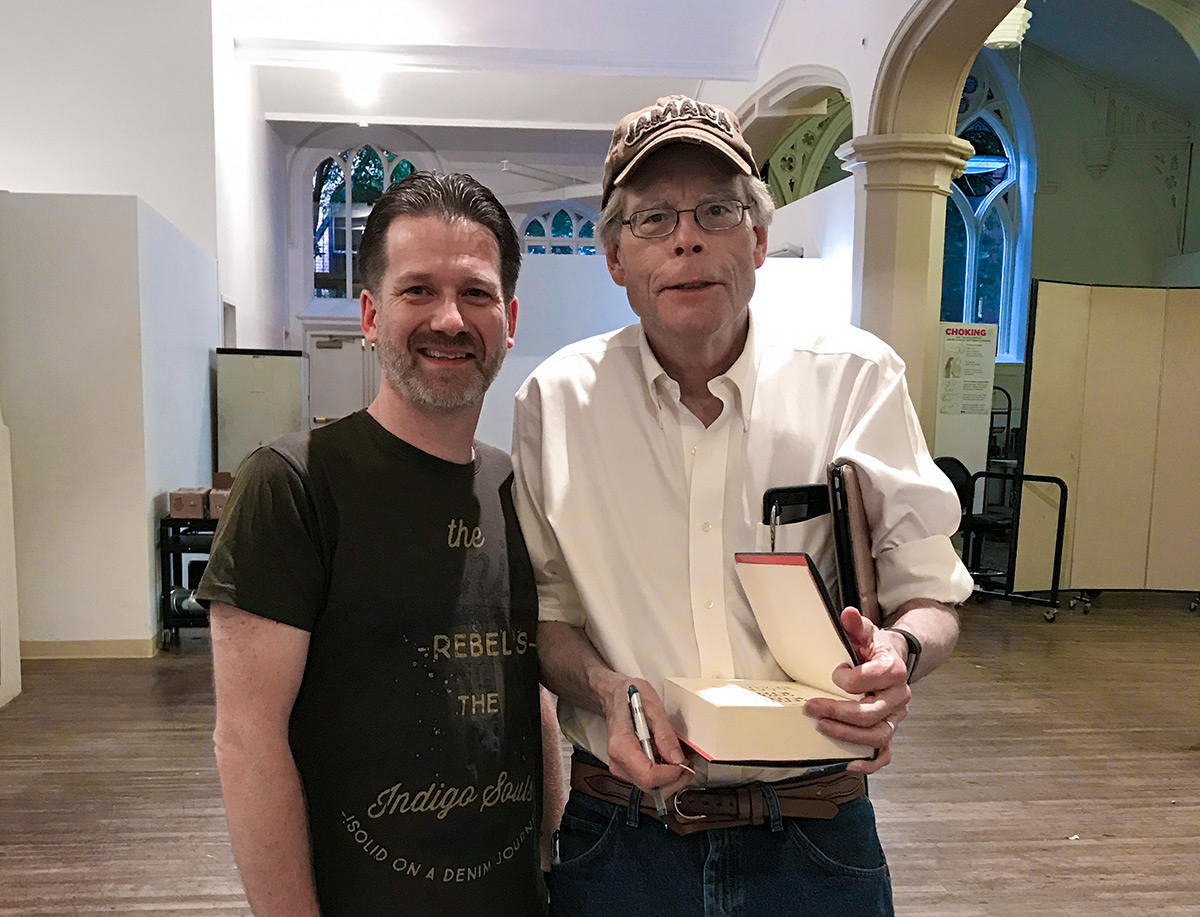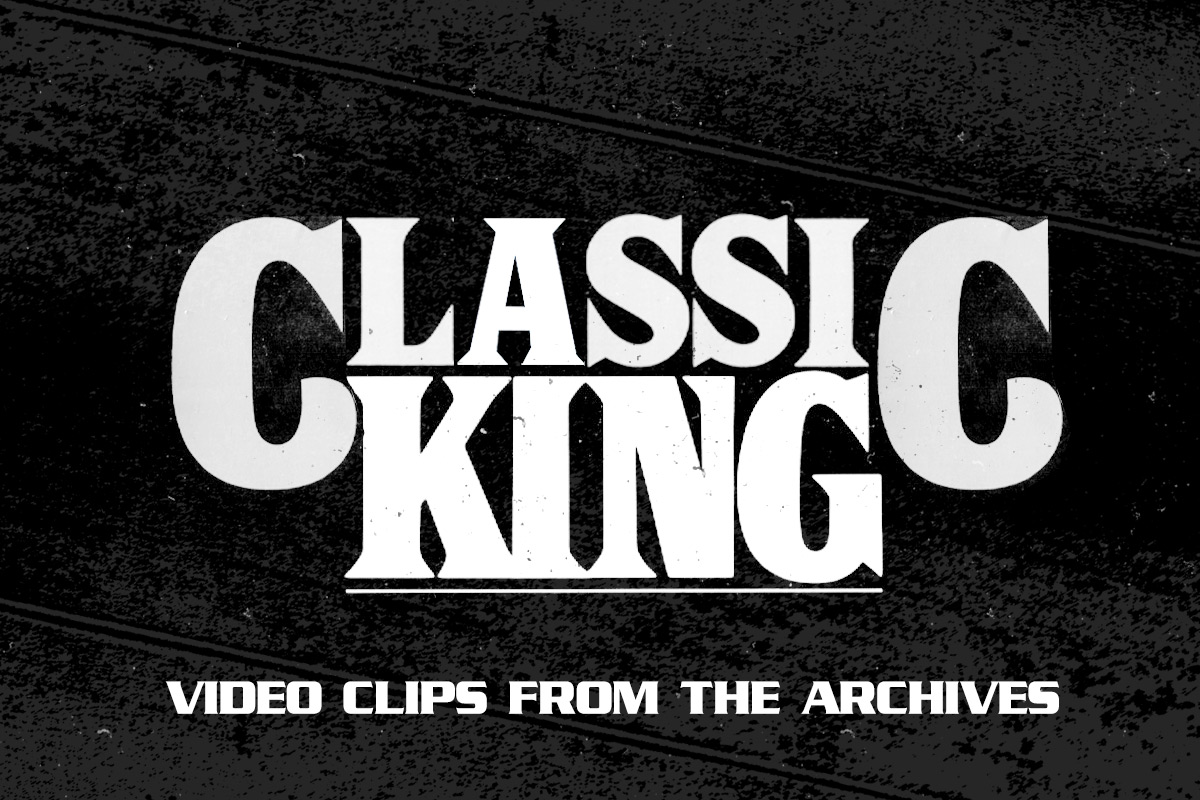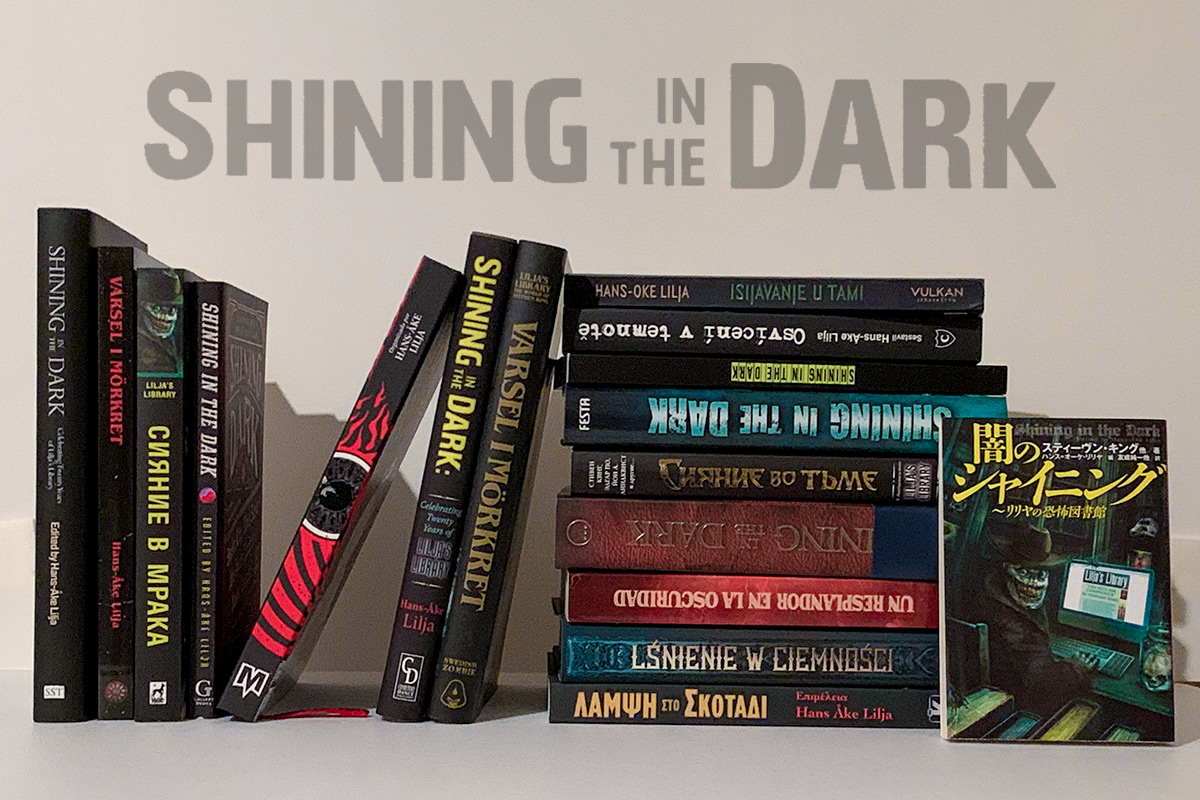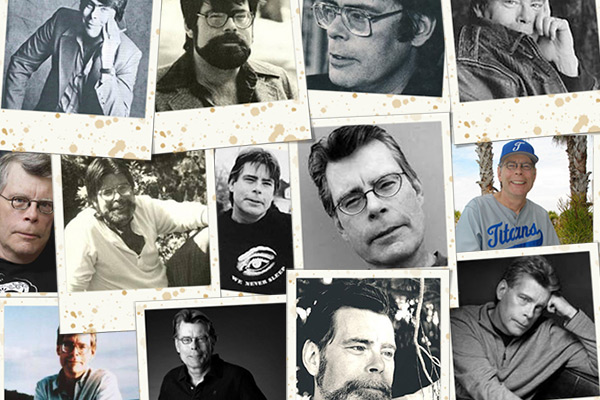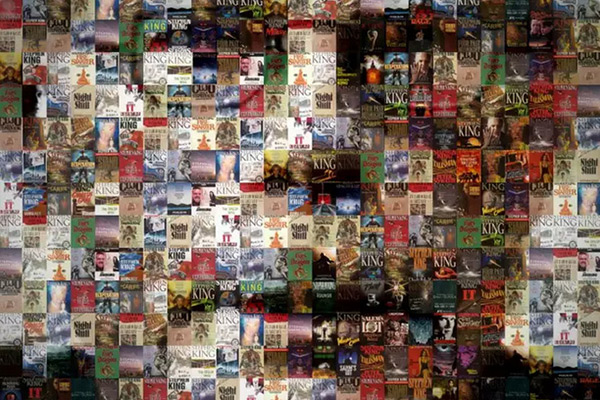Frank Darabont
Posted: January 7, 2008
_
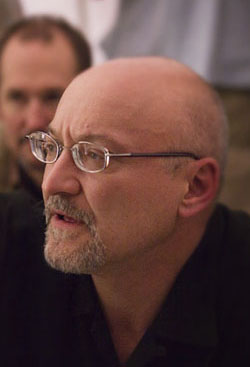 Lilja: Hi Frank. It’s nice to talk to you again. Last time we talked you where about to shoot The Mist and now it’s done and has had its premier. Are you happy with the result?
Lilja: Hi Frank. It’s nice to talk to you again. Last time we talked you where about to shoot The Mist and now it’s done and has had its premier. Are you happy with the result?Frank Darabont: Delighted. It was deeply satisfying to put this story I’ve loved for so long on film. The result is the story I always saw in my head when reading the book—and I’m very happy to say that Stephen King loves the movie. That’s our best endorsement, as well as my greatest personal satisfaction, the fact that it pleases him.
Also very satisfying for me was the opportunity to try a completely different stylistic approach from anything I’d ever done before as a director, which was very exhilarating and liberating for me. It was a blast, tremendously fun in that regard, and a great learning experience.
Mostly I’m very happy that we accomplished what we set out to do, which was to make a movie on a low budget and a very tight schedule—for the record, it was 17 million dollars and a 37 day shoot. That’s not much money these days when major studios are regularly making genre films in the 100 to 200 million dollar budget range. Our goal was to make an ambitious movie with limited resources, very much in the spirit of the grainy low-budget genre films I grew up watching and loving.
Lilja: Personally I really liked The Mist. In fact I think it’s the best adaptation of a King story to date. What reaction have you gotten on the film? Does everybody like it as much as I do?
Frank Darabont: Thanks, I’m so glad you like it!
Overall, reactions have been very gratifying. A lot of people love it and have blessed us with lavish praise…one critic said it’s the best movie of the year and one of the best horror movies ever. I don’t know if that’s true—time is the only real judge of these things—but I appreciate the opinion. The people who have embraced the movie love it for the raw quality, the intensity, and the uncompromising ending.
Of course there are some people who hate it too, and I think for those very same reasons. It’s real and harsh in a way they don’t expect. I think they went in expecting a “popcorn” monster movie with some thrills and a typical ending—a date-night movie, basically—but that’s not what they got. They got a bleak, nasty movie that kicked them in the stomach and said some deeply negative things about humanity they weren’t prepared to hear. That’s not the sort of thing they expect from “just a horror movie,” so it pisses them off.
That’s okay, you’re allowed to hate my movie as much as you’re allowed to love it. I always say there’s never been a movie that was loved by everybody. (I can read you a few scathingly bad reviews I got for Shawshank when it first came out.) But with The Mist, I set out to make a horror movie, which by my definition is intended to horrify and disturb you. If the movie did that, I succeeded. Some people love those sensations and admire the result. Some people don’t; they’d rather go through the motions of a scary movie but not get kicked in the stomach. They prefer horror that doesn’t get too real, and The Mist got too real for some people, especially at the end. And that’s fair too. Like I said, there’s never been a movie that pleases everybody.
What I love is that the film provokes strong reactions either way, but nobody’s walking out unaffected by it. And that delights me, because I don’t want to make a movie that leaves you unaffected, which is the worst way a film can fail…especially a horror film. The films I’ve loved most in the genre didn’t pull their punches, they wanted to fuck with my head. Mind you I’m not comparing my movie with anybody else’s or claiming similar greatness—that would be arrogant and idiotic of me—but Night of the Living Dead leaps to mind. Man, do I love that film. What a subversive piece of filmmaking that was in its day, and it certainly didn’t let us off the hook with warm platitudes or a misplaced happy ending. It kicked us in the stomach instead. So did Carpenter’s The Thing, another admirably disturbing and subversive film. And Cronenberg’s The Fly, another masterpiece. Again, I’m not comparing, I’m just bringing these movies up because they’ve always been genre inspirations for me, iconic high points that took their shit seriously and said something about the human condition. They were made for adults, not the teen date crowd. They did what horror should do, I think…take chances, say something, risk pissing you off. The Thing certainly pissed a lot of people off when it was originally released in 1982, though I thought it was a classic the moment I saw it.

Lilja: And what an ending!!! I just loved it. I still have Goosebumps from seeing it. I must admit that it’s even better then the one King wrote. Did you have to fight to get everyone to agree on having such a dark and sad ending?
Frank Darabont: You can’t have an ending as downbeat as this without many people questioning it along the way. Especially on the business end. It certainly scared off a lot of financiers who were otherwise prepared to fund the film. I had a meeting with one producer, very well known, a guy with his own mini-studio. He was prepared to make the movie for 30 million dollars and offered to write me the check before I even left the room. But he insisted I had to change the ending.
It was a tempting offer, but also one of those “do I sell out or not” moments in life. I asked him what he thought the ending should be. He had no idea, all he knew was that he wanted it to be any ending but this one. I told him I had no idea either, that this was the only ending that made sense to me…and I’d been thinking about it for twenty years! So we shook hands and parted ways.
I suppose for the sake of the money, I could have come up with some other ending. But the truth is, I didn’t want to sell out. I never have before, and saw no reason to start now. I think it would have been lame to tack on a conclusion that let the main character and the audience off the hook. What would that even be? Suddenly the mist parts and the National Guard is handing them coffee and doughnuts and putting blankets on their shoulders? How obvious and not real. It makes me cringe.
So I ended up making the movie for Bob Weinstein, the only guy with the balls to say, “Hey, I love this, let’s make this movie.” Of course I had to make the movie for almost half the money the other guy had offered me—17 million instead of 30. That involved all the typical things: I didn’t take a directing salary upfront, everybody was working for reduced fees, we had to very strictly control the spending, etc. But at least I got to make the movie my way. I’m sure some people will think I’m a moron for walking away from all that dough and others will admire my integrity—and, you know, both opinions are fair. But it’s not as if I had a choice, really. I have to make the movie I see in my head. I can’t render somebody else’s creative vision, I can only render my own, for better or worse. It’s not even ego—the path I have to follow is the one that makes sense to me, otherwise I’d have no idea what the hell I’m doing.
How did you get to think of such a grim ending? I can’t even imagine how David feels when he sees the military arriving.
Frank Darabont: It’s funny…most people assume I came up with that ending entirely on my own. Even Stephen King thought so. And I haven’t yet gone on record to dispute that notion, but I will do so now—a Lilja’s Library exclusive! You heard it here first!
Here’s the truth: the idea for that ending is right out of Stephen King’s book, and I told him so when we were New York together doing the press junket for the movie. He asked me where I’d gotten the idea. I said, “Steve, I got it from you! Look at this line in your story, here in the last chapter…we’re hearing David’s thoughts near the end, and it says: ‘There are three bullets in the gun, there are four of us in the car. If worse comes to worse, I’ll figure a way out for myself.’” (I’m paraphrasing that line right now, but that’s essentially what it says.) Steve got this great look on his face when I told him this, because I think he’d forgotten that he ever wrote it.
So all I did was take King’s darkest thought and follow it to its most logical and horrible conclusion. The idea for the movie’s ending is right there in the original text, I didn’t just come up with an idea out of the blue and tack it onto Steve’s story. I did what I always do when adapting King or any other author—look for clues in the story that give me insight into the author’s thinking and that I can make dramatic use of. I did the same thing quite a bit when adapting Shawshank and Green Mile.
Lilja: And to make it even worse we get to see the lady that left the store to go home to her children standing among the rescued. Talk about slap in the face for the others.
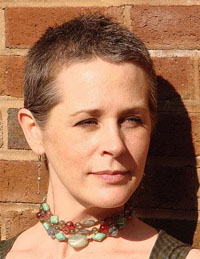 Frank Darabont: I think that was a brilliant touch, one of my favorite things in the movie, but I won’t take credit for it. Here’s how it came about:
Frank Darabont: I think that was a brilliant touch, one of my favorite things in the movie, but I won’t take credit for it. Here’s how it came about:
When shooting on location (we were in Louisiana), you try to cast the smaller roles with actors who live in that region of the country, especially if your budget is small. The less money you have, the less you can afford to fly actors back and forth from Los Angeles all the time, so it makes financial sense to do as much local casting as possible. The woman I hired to play that role, Melissa McBride, was one of those local actors…she lives in Dallas, I think. She’s terrific—I knew from watching her audition tape that she’d be wonderful in the role. Well, the day she played her big scene in the market, she just blew everybody away. The cast, the crew, the extras—everybody was spellbound by what she was doing. Even our most seasoned actors on the set were trading glances and coming up to me between takes saying, “Wow, where’d you find this woman? She’s amazing.” When she finished her last take, the entire store burst into applause. It was a wonderful and spontaneous reaction.
About a week later, after Melissa had finished work on the production and gone home, Jeff DeMunn (who plays Dan Miller in the movie) came up to me. Jeff’s a sensational actor and one of the dearest men I’ve ever known. I hope never to make a movie without him, that’s how much I love him as a friend and colleague. Anyway, he came up to me and said, “Wow, Melissa McBride sure was great the other day, wasn’t she? That character really got under my skin because of how good she was, I can’t stop thinking about it.” Of course I agreed with everything he was saying. So he took this long pause and said, “Do you think it would be cool if that character was one of the refugees at the end of the movie? Maybe catch a glimpse of her riding past with her kids?”
Awesome idea. And it was Jeff’s, based entirely on the excellence of Melissa’s work. It shows you the regard actors can have for one another. We called Melissa and invited her back for an additional day of filming. Thank you, Jeff.
END SPOILER!
Frank Darabont: It’s funny…most people assume I came up with that ending entirely on my own. Even Stephen King thought so. And I haven’t yet gone on record to dispute that notion, but I will do so now—a Lilja’s Library exclusive! You heard it here first!
Here’s the truth: the idea for that ending is right out of Stephen King’s book, and I told him so when we were New York together doing the press junket for the movie. He asked me where I’d gotten the idea. I said, “Steve, I got it from you! Look at this line in your story, here in the last chapter…we’re hearing David’s thoughts near the end, and it says: ‘There are three bullets in the gun, there are four of us in the car. If worse comes to worse, I’ll figure a way out for myself.’” (I’m paraphrasing that line right now, but that’s essentially what it says.) Steve got this great look on his face when I told him this, because I think he’d forgotten that he ever wrote it.
So all I did was take King’s darkest thought and follow it to its most logical and horrible conclusion. The idea for the movie’s ending is right there in the original text, I didn’t just come up with an idea out of the blue and tack it onto Steve’s story. I did what I always do when adapting King or any other author—look for clues in the story that give me insight into the author’s thinking and that I can make dramatic use of. I did the same thing quite a bit when adapting Shawshank and Green Mile.
Lilja: And to make it even worse we get to see the lady that left the store to go home to her children standing among the rescued. Talk about slap in the face for the others.
 Frank Darabont: I think that was a brilliant touch, one of my favorite things in the movie, but I won’t take credit for it. Here’s how it came about:
Frank Darabont: I think that was a brilliant touch, one of my favorite things in the movie, but I won’t take credit for it. Here’s how it came about:When shooting on location (we were in Louisiana), you try to cast the smaller roles with actors who live in that region of the country, especially if your budget is small. The less money you have, the less you can afford to fly actors back and forth from Los Angeles all the time, so it makes financial sense to do as much local casting as possible. The woman I hired to play that role, Melissa McBride, was one of those local actors…she lives in Dallas, I think. She’s terrific—I knew from watching her audition tape that she’d be wonderful in the role. Well, the day she played her big scene in the market, she just blew everybody away. The cast, the crew, the extras—everybody was spellbound by what she was doing. Even our most seasoned actors on the set were trading glances and coming up to me between takes saying, “Wow, where’d you find this woman? She’s amazing.” When she finished her last take, the entire store burst into applause. It was a wonderful and spontaneous reaction.
About a week later, after Melissa had finished work on the production and gone home, Jeff DeMunn (who plays Dan Miller in the movie) came up to me. Jeff’s a sensational actor and one of the dearest men I’ve ever known. I hope never to make a movie without him, that’s how much I love him as a friend and colleague. Anyway, he came up to me and said, “Wow, Melissa McBride sure was great the other day, wasn’t she? That character really got under my skin because of how good she was, I can’t stop thinking about it.” Of course I agreed with everything he was saying. So he took this long pause and said, “Do you think it would be cool if that character was one of the refugees at the end of the movie? Maybe catch a glimpse of her riding past with her kids?”
Awesome idea. And it was Jeff’s, based entirely on the excellence of Melissa’s work. It shows you the regard actors can have for one another. We called Melissa and invited her back for an additional day of filming. Thank you, Jeff.
END SPOILER!
Lilja: I just couldn’t believe what I saw. And even if it sounds harsh I really like that we didn’t get that typical Hollywood ending where all turns out for the best.
Frank Darabont: Thanks, me too. Here’s my favorite anecdote about the ending. We did a test screening of the film in Burbank. Two guys came up to me afterward with tears in their eyes and said, “Frank, we love this movie, but we beg you to change the ending, it’s too much!” After they were gone, two different guys came up, also with tears in their eyes, and said, “Frank, we love this movie, we beg you not to change the ending, it’s perfect!”
As I said, it polarizes audiences. I always figured it would. That’s why I was willing to make the movie so cheaply—I always recognized we were taking a risk, but I also knew if we made it cheaply enough the movie would still earn a profit. As you can imagine, I’m very grateful to Bob Weinstein for taking that risk with me.
Lilja: I was also happy to see how good all the actors where. Even though The Mist is a horror movie it’s very character driven and really shows how people can act under stress. You must be very proud of them?
Frank Darabont: I’m in awe of my cast. And my crew—let’s not exclude them, because they are just as important. Everybody went above and beyond the call of duty and I couldn’t have done it without each of them committing as passionately and working as hard as they did. I’m extremely grateful to them all.
But back to the cast—yes, I’m deeply proud. They excelled, especially considering how fast we were shooting. I say it’s the best work Thomas Jane has ever done, period. Of all his roles so far, this is the one that offered him the most depth as a character. And he made the most of that. He showed up hungry to delve into the emotional layers of the role, not just rely on being the “action hero.” They guy’s a real actor, and he just nailed it. He’s really surprised people because he’s so damn good.
Laurie Holden, I think it’s her best work too—this allowed her to play raw and real in a way her earlier roles haven’t, and I include my own film The Majestic in that. She was brilliant in that film, but Majestic required that she play an idealized “girl next door” perfection. Her character was filtered through a strong romantic perception of a time and place—that’s what the role demanded because it was a sweet period piece with a slightly unreal Frank Capra quality, more idealized than real life. And Laurie did it beautifully. But in The Mist, she gets to play real. A real person you’d meet in line at the market. Raw and earthbound, ballsy, nothing stylized. And she rocks.
Marcia Gay Harden, Andre Braugher…they rock too. I found out when we were shooting that they’ve been friends forever. As actors they’re both forces of nature. Their skills are so sharply honed that being on the set and watching them play their scenes is electrifying. A thrill. All a director has to do is point the camera at them and you’re mining gold. Absolute professionals. I’m so happy and grateful that they graced our movie with their presence. They brought a texture to the film that is irreplaceable.
I’ll say that for the rest of the cast as well. There’s a reason I love working with guys like Jeff DeMunn and Bill Sadler again and again—they’re awesome, a pleasure, total pros. Most of all, they make every film they’re in more memorable by their presence.
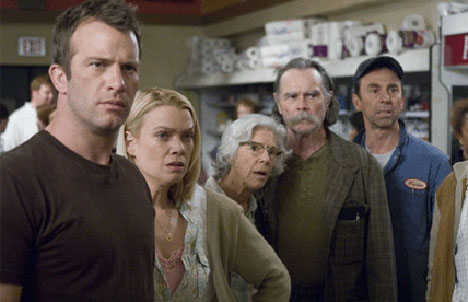
Crap! Now I’m in trouble because I’ve mentioned some actors by name, so now I have to mention them all—but I have a big cast! I do want to acknowledge them all though, because they richly deserve it, but I’ll go quickly:
Frances Sternhagen. I’ve been a huge fan of hers since the movie Starting Over. I was so honored to work with her at last. Talk about a pro, a delight. And apparently tireless! All that running she did at her age, and never a word of complaint.
Alexa Davalos. An amazing young talent. Check out Robert Benton’s film Feast of Love, or Ed Zwick’s next movie (sorry, I forget the title, but it’s his next one coming up). Keep your eye on Alexa, folks, because she’s going to be a significant actress with a major career. I’m not kidding. And remember you heard it here first.
Sam Witwer. He nailed his audition for The Mist so perfectly that I never even looked at another actor for the role, I just hired him immediately. He’s exceptional. I love his enthusiasm. He’s a science-fiction/horror geek like me. Fans will know him from his exemplary work on Battlestar Galactica and Dexter.
Nathan Gamble. Wow, what a wonderful kid. Everybody fell in love with him—and his family, who are the nicest people ever. I’ve never seen a 9 year-old with such a mature grasp of what he’s doing. He’s got serious talent. My favorite scene in the movie is when he’s sobbing and begging Tom not to go to the pharmacy—the actors are superb there, but keep in mind that Nathan’s only nine years-old! And he’s playing it with as much power and conviction as the adults. No tricks or makeup involved, either—all those tears, everything was just purely Nathan’s performance. I remember when we shot that, people were gathered around the monitors just blown away by what he was doing.
I haven’t yet mentioned Toby Jones because I peeked ahead and saw your next question. But before we move on to him, let me also acknowledge Rob Treveiler (Bud), David Jensen (Myron), and Chris Owen (Norm)—superb character actors in the Jeff DeMunn and Bill Sadler tradition. They too brought something special to the movie and I loved working with them. Oh, and Jack Hurst, too! The burned guy. I love all my actors and could rave about them all day. Even the extras did an amazing job.
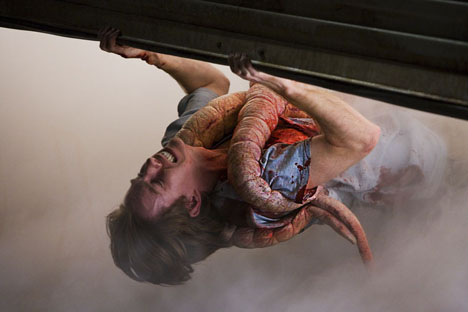
Lilja: Even though everyone is very good I’m most impressed of the casting of Toby Jones as Ollie. He is perfect. Was he your first choice?
Frank Darabont: Toby was not my first choice, but that’s only because I wasn’t yet aware of him. He’s from England and wasn’t well known here at that time (but that’s changing). And I hadn’t yet seen his work in Infamous or Painted Veil when we started casting last year. But my casting director, Deb Aquila, told me to watch those films immediately because she was crazy for Toby and was convinced he should play Ollie. I watched both films and loved them, Painted Veil especially. Toby just shines in both. Of course now he’d always be my first choice. He’s an extraordinary actor. His Ollie is perfection.
By the way, are you aware Toby’s father is the great British character actor Freddie Jones? Look him up on IMDB, he’ll blow your mind—he played Mr. Bytes in The Elephant Man, among hundreds of other roles. When I first met Toby and realized who his dad is, I totally geeked out. Toby was surprised I knew who his dad is and that I’m such a big fan.
Lilja: Now I guess we just have to wait for the Oscar nominations to see how many The Mist gets? Both The Shawshank Redemption and The Green Mile have been nominated and even though it’s harder for a horror movie to be nominated there are a lot of actors in The Mist that ought to be.
Frank Darabont: I appreciate your kind thought, but there’s no way we’ll get any nominations. A low-budget horror movie like ours isn’t even on the Oscar radar screen. I do agree my actors would be deserving of recognition for the work they’ve done—perhaps they’d get that recognition if they’d been in another kind of movie—but not this one.
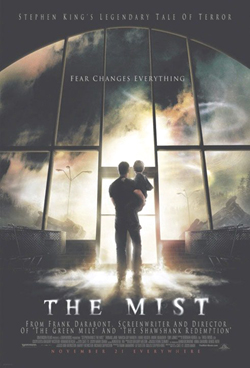 Lilja: Last time we spoke you mentioned that you might do a limited book version of The Mist. Is that still the plan?
Lilja: Last time we spoke you mentioned that you might do a limited book version of The Mist. Is that still the plan?Frank Darabont: Yes. I’m working on it now and hoping to have it out in time for the DVD release. That would be excellent timing.
Lilja: What can you tell me about The Mist DVD? What can we expect to find on it except the movie?
Frank Darabont: We're discussing those now, but no decisions have been made yet.
Lilja: How about a script book of The Mist. Like the once we got about The Shawshank Redemption and The Green Mile? Any plans for such a book?
Frank Darabont: Here’s another Lilja exclusive: The limited will include both Stephen King’s original story and my screenplay. That’s not the way I originally planned it—I always figured I would just present Steve’s story by itself. But suddenly Steve had the idea to include my screenplay too. In fact, he insisted on it—he said he’d only agree to do the book if we included both. He didn’t have to try very hard to convince me. I told him I’d be very honored to be in the same book with him.
Lilja: Your next Stephen King movie is The Long Walk, right? Where are you with that one now? Is a script written?
Frank Darabont: There isn’t a script yet. I plan to write it this year.

Lilja: I guess that script will demand a lot if you’re going to succeed in making it into a feature film. The Long Walk is one of my favorite books but you must admit that it’s not the first book you’re thinking of when you think of a Stephen King book tuned into a movie. What got you hocked on that particular book and aren’t you worried that it’s not doable as a movie?
Frank Darabont: What makes The Long Walk a great story is how stripped-down and spare it is. Not much plot—just kids walking, talking, and dying. It’s a very existential work, Stephen King meets Eugene Ionesco. And that’s what I love about it. It’s small and fascinating and weird, and I think the movie should be too. It’s more of an art house movie the way Steve wrote it. I don’t want to reinvent it or blow it out of proportion to justify it as a big commercial film, which is how they screwed up The Running Man. I’m not sure it’s even possible with material like The Long Walk. Of course doing it faithfully means I’d have to do it cheaply—far more cheaply than The Mist—but at least I can stay true to what Steve wrote. Perhaps as a cool little film for HBO or Showtime?
Lilja: Last time you also mentioned The Monkey? Any news on that one?
Frank Darabont: I’m hoping to write that script this year too. We’ll see how it turns out. It might make a good theatrical feature. We’ll see.
Lilja: Any other King/Darabont collaborations that you can talk about?
Frank Darabont: We’re going to have a baby through in-vitro fertilization. No, that’s not true. I’m just messing around. I should know better, because that’s how rumors get started.
Lilja: What else are you up to? I guess you might be taking a well-deserved break now that The Mist is done.
Frank Darabont: Yes, I need it. I’ve never made a movie this quickly. We started prepping the film in January and we finished everything at the end of October—ten months of production from start to finish. (Plus I did a few months prior to that casting actors with Deb and designing monsters with Nicotero, so maybe twelve months for me in all?) I’m glad I did it, I’m glad I proved I could do it, but I don’t want to do it that way often. It kills you, it’s intense and exhausting. What I learned making The Mist is that it’s just as hard making a 17 million dollar movie as it is making a 67 million dollar film like Green Mile. But with a bigger budget, you at least have the additional advantage of time.
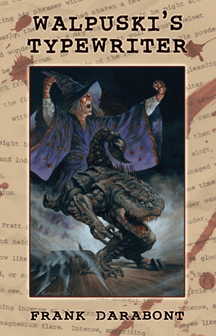 Lilja: When can we expect a new book from you? I enjoyed Walpuski’s Typewriter a lot and would really like another book.
Lilja: When can we expect a new book from you? I enjoyed Walpuski’s Typewriter a lot and would really like another book.Frank Darabont: Thanks! I remember that great review you wrote, it really made my day. Did you also happen to see my short story in the book Odder Jobs, the Hellboy anthology edited by Chris Golden? My story’s sort of a Twilight Zone-style western called Brotherhood of the Gun. I’m proud of that little story, it was tremendously satisfying and fun to do.
I am working on a few book or short story projects like those right now, but nothing worth mentioning because I don’t know if they’ll ever be finished. Writing prose fiction is a very part-time thing for me, something I do just for enjoyment on the rare occasion that I have spare time from my real job. It’s great writing just for the pleasure of it, with no financial or career objectives attached, or the pressure of a film production involved. But of course those pressures tend to get things done. When you’re writing solely for pleasure, things have a way of never getting completed.
Lilja: OK, thanks for taking the time to talk to me. I enjoyed it!

